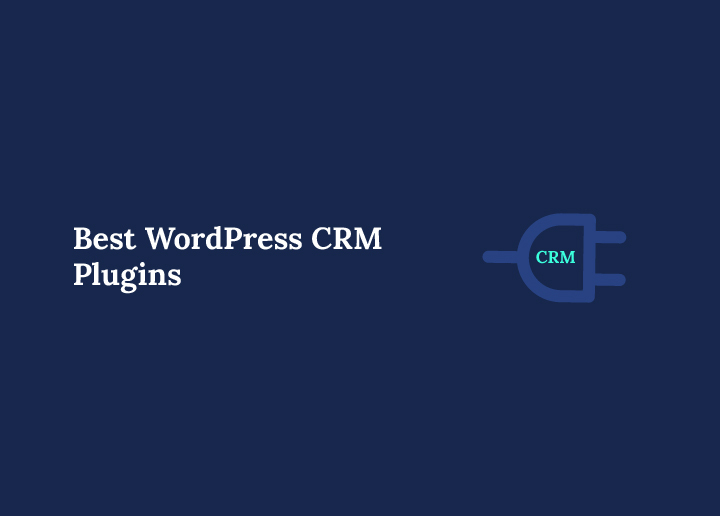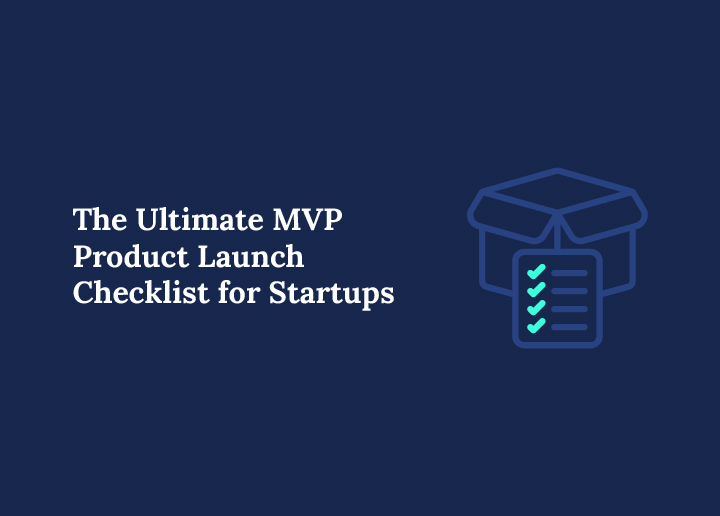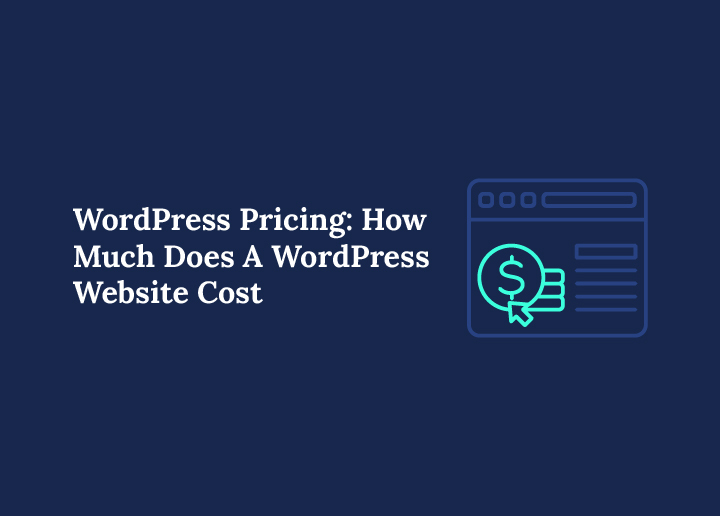Managing customer relationships is key to growing any business, whether you’re running a small online store or a full-fledged agency. That’s where CRM (Customer Relationship Management) tools come in. If you’re using WordPress, you’re in luck, there are some powerful CRM plugins that make it easy to track leads, manage contacts, and stay on top of your customer interactions without ever leaving your dashboard.
In this blog, we’ll explore the best WordPress CRM plugins for 2025. Whether you need something simple and lightweight or a robust system packed with features, there’s something here for everyone. Let’s dive in and find the perfect CRM solution for your WordPress site!
Understanding the Role of CRM in Boosting Sales
Before diving into the plugins, grasping why CRM is crucial in today’s business landscape is essential. At its core, CRM is about understanding your customers’ needs, interactions with your brand, and how these interactions evolve.
A good CRM system stores information and makes it actionable. It allows you to tailor your sales strategies to meet customer needs more effectively, predict future buying behaviors, and personalize communications at scale.
The Top WordPress CRM Plugins to Elevate Your Sales Game
Looking to implement a CRM solution on your WordPress site? Explore these top seven CRM plugins to enhance your customer management:
FunnelKit Automations
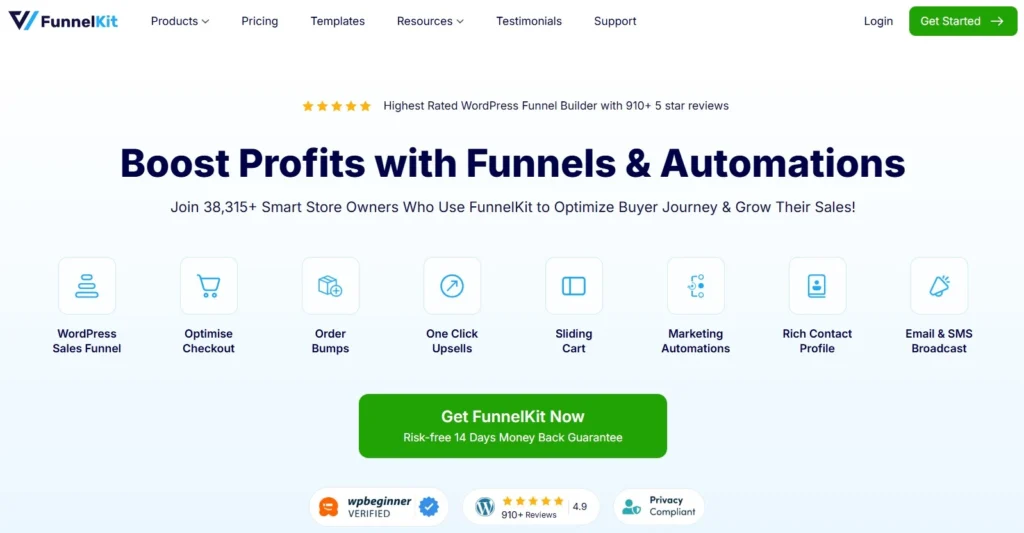
FunnelKit Automations is a powerful WordPress-based CRM and marketing automation platform, trusted by over 29,000 sites. It’s designed to help WooCommerce and WordPress site owners create advanced customer journeys, nurture leads, and boost sales all without leaving the WordPress dashboard.
Key Features:
- Advanced visual automation builder for personalized customer journeys
- Integrated CRM system to store and manage contact data
- Powerful email & SMS marketing with segmentation and tagging
- Pre-built workflow templates for cart recovery, post-purchase upsells, and customer re-engagement
- Deep integration with WooCommerce, enabling detailed customer insights and purchase tracking
With its seamless WooCommerce integration and robust automation tools, FunnelKit Automations is an excellent alternative to solutions like Groundhogg, offering both CRM capabilities and revenue-boosting automation in one package.
HubSpot CRM
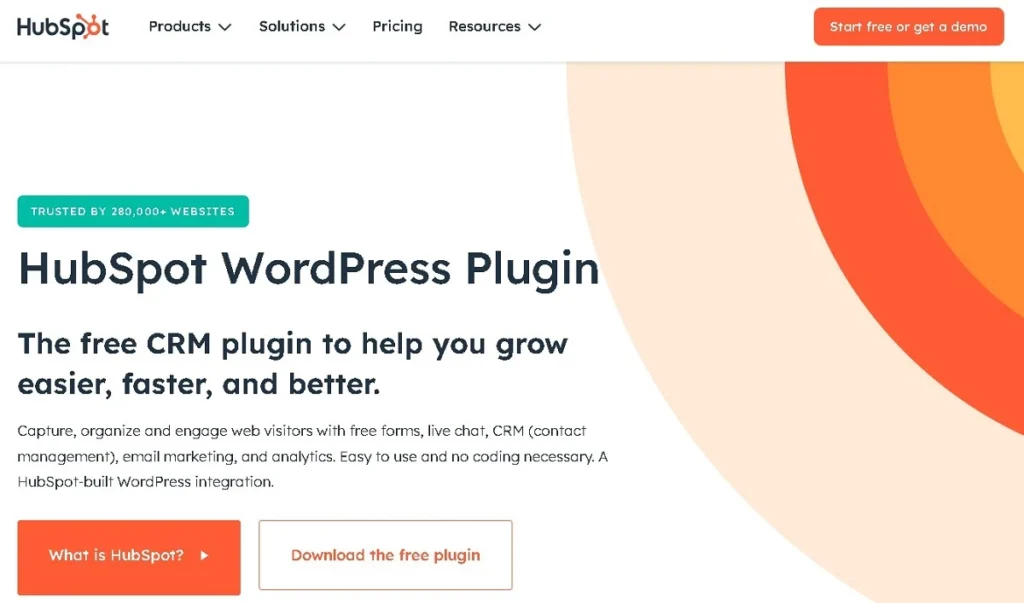
- Downloads: 280,000+
- Rating: 4.5/5
- Best for: Marketing automation
- Price: Freemium; Premium plans start at $45/month
HubSpot CRM is an all-encompassing marketing plugin designed to streamline your customer database management directly within the WordPress dashboard. The core plugin includes essential client management features like live chat, basic chatbots, and lead qualification. For more advanced functionalities, HubSpot offers:
Key Features:
- Seamless integration with WordPress and applications like Outlook and Gmail.
- Dynamic contact form builder with pop-ups and conditional logic.
- Email marketing with a drag-and-drop editor and automated responses.
Groundhogg
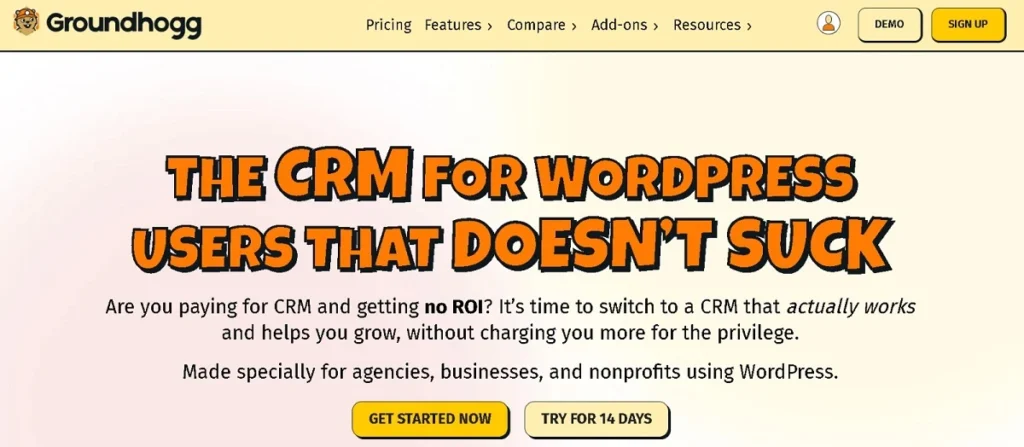
- Downloads: 3,000+
- Rating: 4.9/5
- Best for: Custom funnel creation
- Price: Freemium; Premium plans start at $20/month
Groundhogg stands out for its user-friendly approach to CRM, offering robust email marketing and sales automation tools without additional fees per contact. The pricing tiers include:
Key Features:
- Intuitive CRM funnel builder with templates and drag-and-drop functionality.
- Unlimited contacts, emails, and custom field management.
- WordPress sync for seamless integration with other plugins.
- GDPR compliance features for privacy law adherence.
WP ERP

- Downloads: 650K+
- Rating: 4.4/5
- Best for: Business management
- Price: Freemium; Premium version at $9.99/month plus $3 per user
WP ERP combines CRM, accounting, and HR management in one comprehensive plugin, ideal for businesses looking for an all-in-one solution. The Pro version includes nine premium extensions with options for additional purchases.
Key Features:
- Built-in mailing system for accessible communication.
- Project management module for real-time tracking.
- B2B management tools for handling business partners and client contacts.
- Supports multiple currencies for global business operations.
Migrate to HubSpot CRM Today!
Our seamless CRM to HubSpot migration service gets you up and running fast, with zero headaches.
CRM & Lead Management by vCita
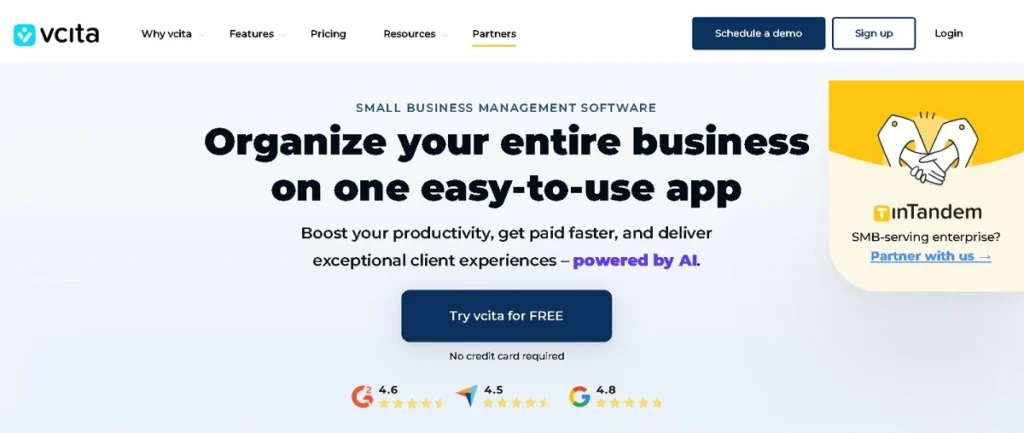
- Downloads: 150,000+
- Rating: 4.5/5
- Best for: Lead management
vCita offers a robust solution for lead and customer relationship management. It features a secure client portal for scheduling and file sharing and a mobile CRM app for on-the-go management.
Key Features:
- Easy contact management with automatic capture from your site.
- Client management tools for marketing campaigns and smart follow-ups.
- Lead capturing widget to increase engagement and sales.
UpiCRM
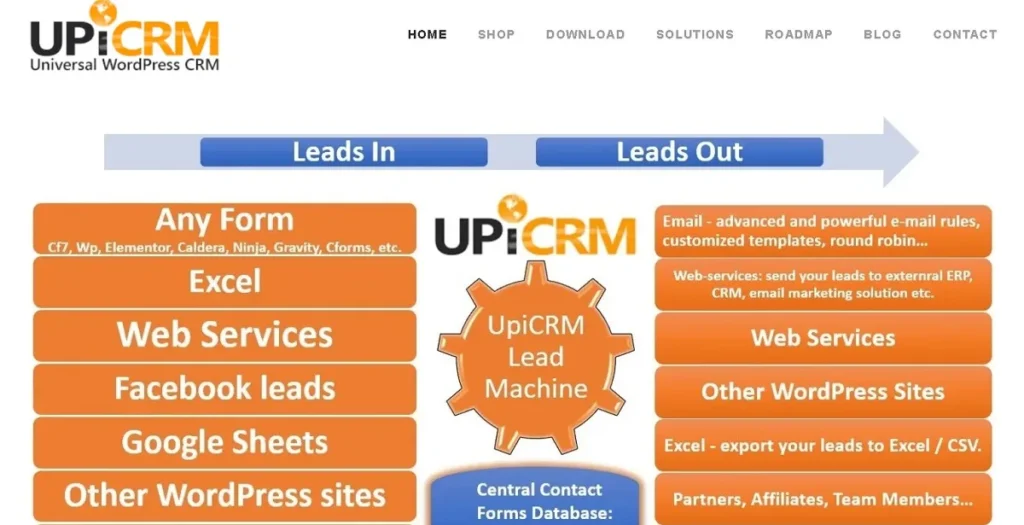
- Downloads: 3500+
- Rating: 4.6/5
- Best for: Lead management
UpiCRM is a free solution focused on lead tracking and management. It is compatible with popular WordPress form plugins and offers advanced features like a KPI dashboard and collaboration tools for efficient team coordination.
Key Features:
- Advanced lead tracker using forms and traffic source tagging.
- Supports multisite environments for centralized lead management.
WooCommerce Customer Relationship Management
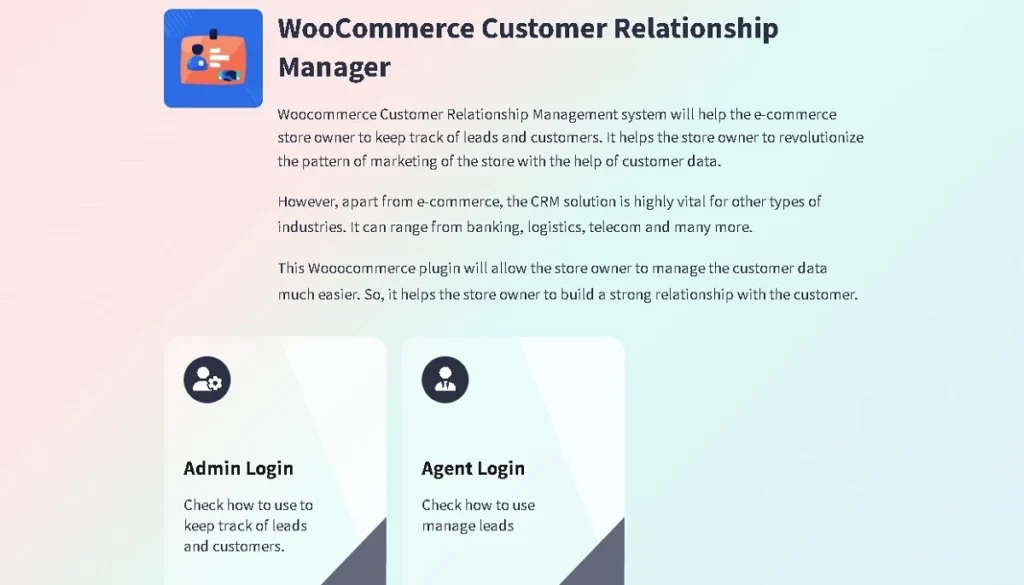
- Price: $59
- Reviews: 3.88/5 (CodeCanyon.net)
- Active Installations: 3,900+
Designed for WooCommerce users, this WooCommerce CRM plugin enhances customer management by tracking orders, adding notes, sending emails, and making calls directly from the admin area.
Key Features:
- Integrated with WooCommerce for seamless e-commerce operations.
- Call functionality within the contact record for direct customer
Zoho CRM
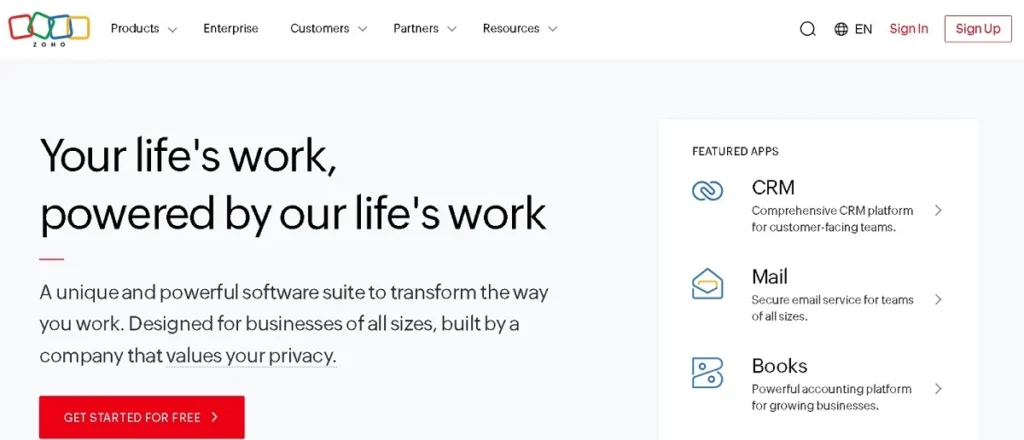
- Downloads: 4,000+
- Rating: 3.6/5
- Best for: Lead capturing
- Price: Freemium (Premium plans start at $14/month)
Zoho CRM integrates seamlessly with WordPress, enhancing your site with powerful lead-capturing and management capabilities. Compatible with widely used form plugins such as Ninja Forms, Gravity Forms, and Contact Form 7, Zoho CRM is a versatile tool for businesses aiming to streamline their lead generation process.
Key Features:
- Enables precise tracking of customer locations, adding depth to lead data.
- Automatically scores leads based on behavior, demographics, and custom criteria, facilitating prioritized follow-up and engagement.
- Effortlessly create and integrate web forms into WordPress, capturing leads without coding.
Additional WordPress CRM Plugins
Let’s explore the additional WordPress CRM plugins:
UkuuPeople
To simplify managing customer relationships, the creators of UkuuPeople had one goal when creating the product. You will find four main admin functions in the WordPress CRM plugin: People, Touchpoints, Add-ons, and Settings.
You can not only manage your contacts here, but you can also assign tasks, add team members, and even schedule meetings in addition to managing your contacts.
WP-CRM
WP-CRM extends WordPress’ user management system and allows custom metadata to be added. The number of attributes you can add to contacts and customize them to your liking is unlimited. Setting up notifications is possible with a bit of knowledge of code.
Read: Best WordPress Speed Optimization Plugins
Jetpack CRM
As one of the “simplest and quickest” WordPress CRM plugins on the market, Jetpack CRM advertises itself as being the best out there.
Besides offering the usual CRM functionality, such as managing customers, adding custom fields, and providing front-end lead forms, the plugin also offers online invoicing, a client portal, and integration with Zapier in addition to giving online invoicing, a client portal, and integration with Zapier.
Presspoint CRM
Many people opt for Presspoint because it offers many features that one would not easily find in an unpaid option. This high-end tool is more popular than free tools. This tool can automate sending emails, managing opportunities, creating custom forms, and conducting e-commerce transactions. You can also make a custom profile and directory.
Read: Reading Time WordPress Plugins
Choosing the Right CRM Plugin for Your WordPress Site
With so many options, selecting the right CRM plugin can seem daunting. However, the decision should be guided by your specific business needs, including:
Size and Scale
Consider the size of your customer base and the complexity of your sales processes. Larger businesses with more complex needs may require a more robust CRM solution, while smaller enterprises benefit from a more straightforward, intuitive plugin.
Integration Capabilities
Evaluate how well the plugin integrates with your existing WordPress ecosystem, including eCommerce platforms, marketing tools, and other plugins you rely on.
Read: Best WordPress Membership Plugins
Budget Considerations
While some CRM plugins offer free versions, others require a subscription. Consider the long-term cost implications and the ROI the plugin will likely generate for your business.
Usability and Support
A CRM plugin should be user-friendly and supported by comprehensive documentation and responsive customer support. This ensures you can maximize the plugin’s value and swiftly resolve any issues.
Read More: Best WordPress Redirect Plugins (Free & Paid)
Implementing Your WordPress CRM Plugin Effectively
The successful implementation of a CRM plugin is critical to its effectiveness. Here are some key considerations:
- Data Migration: If you’re transitioning from another CRM system, ensure you can seamlessly migrate your existing data to avoid losing valuable customer insights.
- Training and Onboarding: Invest time in training your team on how to use the new CRM system effectively. This might involve internal training sessions or leveraging resources the plugin developer provides.
- Customization: Customize the CRM to fit your specific sales processes and workflows. Many CRM plugins offer a range of customization options to tailor the system to your needs.
- Integration Testing: Before fully committing, test the CRM plugin’s integration with your website and other tools to ensure compatibility and smooth operation.
Further Reading: Best WordPress Accessibility Plugins
Making the Most of CRM Data for Strategic Sales Insights
The true power of a CRM system lies in the data it gathers and how you use that data to make informed decisions. Analyzing customer interactions, purchase history, and engagement patterns can uncover valuable insights about your sales strategy.
For instance, identifying your most profitable customer segments can help you tailor your marketing efforts to attract similar prospects. Similarly, analyzing customer feedback and support inquiries can highlight areas for product improvement or new product development opportunities.
Enhancing Customer Experience with Personalization
Personalization is critical to standing out and building lasting customer relationships in today’s competitive market. A CRM plugin lets you personalize every aspect of the customer journey, from targeted emails based on past purchase behavior to personalized product recommendations on your website.
By making customers feel valued and understood, you can increase customer loyalty, encourage repeat business, and boost overall sales.
Know More: Best WooCommerce Plugins [Free+Paid]
Automating Sales Processes to Increase Efficiency
One significant advantage of a CRM plugin is automating routine sales tasks. From lead capture and nurturing to follow-up emails and customer segmentation, automation can save your team time and ensure no lead falls through the cracks.
Moreover, automation can help maintain a consistent communication cadence, ensuring your brand stays top-of-mind with prospects and customers.
Tracking and Analyzing Sales Performance
A robust WordPress CRM plugin will offer comprehensive reporting and analytics features, allowing you to track key sales metrics and assess the performance of your sales efforts. This data is invaluable for understanding what’s working and what isn’t, enabling you to adjust your strategies in real time.
For example, tracking conversion rates across different marketing channels can help you allocate your budget more effectively while understanding customer churn rates can inform customer retention strategies.
Explore: Top Lead Generation Plugins for WordPress
Integrating CRM with Other Sales and Marketing Tools
To maximize the effectiveness of your CRM, it’s essential to integrate it with your other sales and marketing tools. Many WordPress CRM plugins offer integrations with email marketing platforms, social media management tools, and e-commerce systems.
These integrations create a cohesive ecosystem where data flows seamlessly between tools, providing a more comprehensive view of your customers and streamlining your sales and marketing processes.
Best Practices for CRM Success
To ensure the success of your CRM initiative, consider the following best practices:
- Keep Your Data Clean: Regularly update and maintain your CRM data to ensure accuracy and relevance. Clean data is the foundation of effective sales and marketing strategies.
- Train Your Team Continuously: As your business evolves, so should your use of CRM. Invest in ongoing training for your team to maximize the tool’s capabilities.
- Listen to Customer Feedback: Use your CRM to gather and analyze customer feedback. This insight is invaluable for improving your products, services, and overall customer experience.
- Stay Flexible: Be prepared to adapt your CRM usage as your business grows and changes. What works today might not work tomorrow, so stay flexible and open to change.
Conclusion
A WordPress CRM plugin is not just a tool for managing customer data; it’s a strategic asset that can transform your sales and marketing efforts. By choosing the right plugin, implementing it effectively, and leveraging its full potential, you can enhance customer relationships, streamline your sales processes, and drive significant business growth.
Remember, the ultimate goal of CRM is to create a customer-centric business that anticipates and meets customer needs at every turn, fostering loyalty and driving sales. With the right approach, your WordPress CRM plugin can unlock this potential and propel your business to new heights.
FAQs About WordPress CRM Plugins
Does WordPress have a CRM?
Yes, WordPress can absolutely have a CRM system, thanks to its flexible ecosystem of plugins. While WordPress is primarily a content management system, you can easily turn your WordPress website into a powerful CRM (Customer Relationship Management) tool using plugins like Jetpack CRM, WP Fusion, or other free WordPress CRM plugins.
These tools help you manage contacts, track leads, view contact form submissions, and even automate follow-ups, without ever leaving your WordPress environment.
What is a CRM in WordPress?
A CRM in WordPress is a tool or plugin that helps you manage contacts, track interactions, segment users, and automate your business processes, all within your WordPress website.
Instead of using external tools like Salesforce CRM, some businesses prefer a self-hosted CRM that works directly with their WordPress database. These solutions are ideal for small businesses, agencies, and eCommerce sites that want to own their data and reduce costs.
With the right plugin, your WordPress CRM can handle:
- Lead generation via contact forms
- Customer follow-ups via email campaigns
- Sales tracking and sales pipeline visibility
- Reporting and analytics with custom reports
- Integration with marketing automation platforms and email marketing tools
Whether you’re running an online store, a blog, or an agency site, a WordPress CRM system helps streamline operations and boost customer engagement.
How to create a CRM in WordPress?
Creating a CRM in WordPress is easier than you might think. Here’s a quick guide:
- Install a WordPress plugin like Jetpack CRM or WP Fusion.
- Configure your CRM settings to match your business needs, like sales stages, customer profiles, or project tracking.
- Use integrations with contact forms, email marketing tools, or accounting software.
- Start capturing leads from your online store or contact form submissions.
- Use features like sales pipeline management, custom reports, and automated emails to grow customer engagement.
You can also customize your WP CRM system to include project management, track customer information, or connect it to accounting tools and email marketing services for a complete business dashboard.
If you’re tech-savvy, you can even build on your WordPress user database and create a fully custom WP CRM system using custom post types and fields. That’s how some folks turn their sites into a million dollar business.
What is the best CRM for WordPress?
The best CRM for WordPress really depends on your business needs, but here are a few top choices:
- Jetpack CRM: A self-hosted CRM built specifically for WordPress. Great for small businesses and freelancers looking to manage customer information, invoices, and sales pipelines.
- WP Fusion: Not your traditional CRM, but it connects your WordPress user database to external marketing automation platforms and email marketing tools like Mailchimp or ActiveCampaign.
- HubSpot WordPress plugin: Offers crm and marketing automation in one dashboard. It’s perfect if you’re already using HubSpot or want a free CRM with email campaigns, custom reports, and lead tracking.
- Groundhogg: A free plugin that combines CRM with email marketing services inside WordPress. It’s designed to help automate repetitive tasks.
These are among the best CRM plugins and work seamlessly with your WordPress database, popular WordPress plugins, and even enhanced ecommerce setups like WooCommerce.
